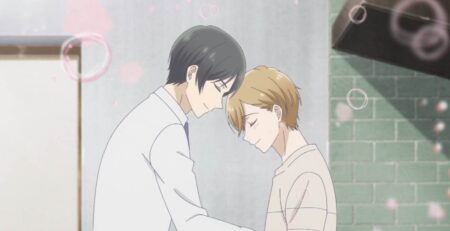Glass Syndrome offers up two stories, while the titular vignette is the large focus of the volume taking up over 100 pages of the 196-page one-shot manga by mangaka Eido Ariki. Glass Syndrome is published and localized in English by TOKYOPOP through the publisher’s Love X Love line of books, which focuses on queer stories in manga, in this case, BL. The anthology volume features translation by Christine Dashiell and retouching & lettering by Vibrant Publishing Studio. Also working on this title are copy editor Tina Tseng, editor Lena Atanassova, and graphic designer Sol DeLeo.
In Glass Syndrome, Nijou is the perfect student. He’s class president, great at sports, and beloved by all his classmates, especially the girls, but all of that is just a front. It’s who he has to be for other people, while he hides his true feelings, which includes fear of letting people down through imperfection and a terror of being close to others, emotionally and physically. But with the status as the most responsible and respected in his class, his teacher asks Nijou to check in on Toomi, a student who hasn’t been to school in quite some time.
Like a lot of romances, Toomi is the exact opposite of Nijou. Alone, Toomi is astutely aware of Nijou’s fear of closeness and the pressure he wears beneath his dutiful smile. Instead of giving, Toomi gets belligerent and pushes Nijou towards a breakdown. But in that, the two start to see more in each other. Plus, while Nijou is hiding an emotional secret, Toomi is hiding his own; to pay off his father’s gambling debts, he performs in drag on an adult cam site as “Haruka.” When Nijou accidentally discovers the truth, their growing friendship comes into question, as he struggles with whether he should tell Toomi or not. The catch? Nijou is beginning to develop feelings for “Haruka” – and realizes that the feelings are for Toomi.
For what it’s worth, Glass Syndrome uses trauma effectively. It uses guilt and shame as a narrative push but detached from their sexuality. Toomi is ashamed because of the life he has to lead to pay back his father’s debts, and Nijou is filled with guilt because he has a window into Toomi’s life that he wasn’t given permission to have. The beauty of the story is how the two confront these elements. For both of them, they become each other’s safety, both physically and emotionally. They fight, push each other, and once they show their vulnerability, they exit the other side of angst, connected and respectful of each other.
Outside of the main bulk of the one-shot, there are three other stories that last about a chapter’s length each. One is a sequel to the main story, which is essentially a side story. With this, readers get to see a peek into Nijou and Toomi’s life together. In the other two stories, we get a small chapter about unrequited love entitled “Similar Figures of Love” and its sequel focused on different characters.
“Similar Figures of Love” looks at a love triangle based on unrequited love. Kasumi is in love with his childhood friend Chihiro, but Chihiro has a crush on a girl. That said, Saiki, Kasumi’s upperclassman, is in love with Kasumi. At breakneck speed, we see Kasumi come to terms with his unrequited love and Saiki push forward in his as well. And the sequel that closes out Glass Syndrome offers little more to the story because of its length.
Truthfully, Glass Syndrome’s main story is around five chapters, and with the sequel, which could have been considered a 5.5, I’m unsure why “Similar Figures of Love” is in this one-shot at all. It’s not a bad story, but rather it’s too fast and too short to appreciate the characters or their struggle. On its own, Glass Syndrome’s title story is good and emotional, but with the added vignette, this one-shot misses out on a perfect score.
Overall though, Glass Syndrome is well worth the buy. While there are elements of trauma on display, it’s never too much to handle as a reader, and the care and vulnerability that Nijou and Toomi exude even while they have their walls up is well done. And for them alone, you should dive into this one-shot.
Glass Syndrome is available wherever books are sold now.
Glass Syndrome Volume 1
TL;DR
Glass Syndrome is well worth the buy. While there are elements of trauma on display, it’s never too much to handle as a reader, and the care and vulnerability that Nijou and Toomi exude even while they have their walls up is well done. And for them alone, you should dive into this one-shot.





